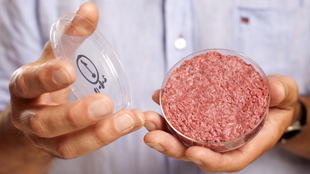 DAVID PARRY, ASSOCIATED PRESSIn a demonstration of the possible future of food, three people tasted the first lab-grown burger in London on Monday (August 5), including its creator Mark Post, a vascular biologist at the University of Maastricht. Post spent 2 years making the single 5-ounce cultured beef patty as a $325,000 pilot test—funded by Google co-founder Sergey Brin—for producing a high-quality protein source that he said would promote animal welfare, curb global food shortages, and combat climate change.
DAVID PARRY, ASSOCIATED PRESSIn a demonstration of the possible future of food, three people tasted the first lab-grown burger in London on Monday (August 5), including its creator Mark Post, a vascular biologist at the University of Maastricht. Post spent 2 years making the single 5-ounce cultured beef patty as a $325,000 pilot test—funded by Google co-founder Sergey Brin—for producing a high-quality protein source that he said would promote animal welfare, curb global food shortages, and combat climate change.
“What we are going to attempt is important because I hope it will show cultured beef has the answers to major problems that the world faces,” said Post in a statement, adding that he expects commercial production of the lab-grown meat could begin in 10 to 20 years.
The in vitro burger was derived from stem cells taken from cow shoulder muscle. The cells were cultured in Petri dishes where they were bathed in a nutrient solution to encourage differentiation into muscles cells, which then formed small strands of muscle fibers. Post created the patty by knitting together around 20,000 such strips. The meat was mixed with egg powder, breadcrumbs, and salt, then pan-fried with butter and served on a bun with lettuce and tomato ...




















